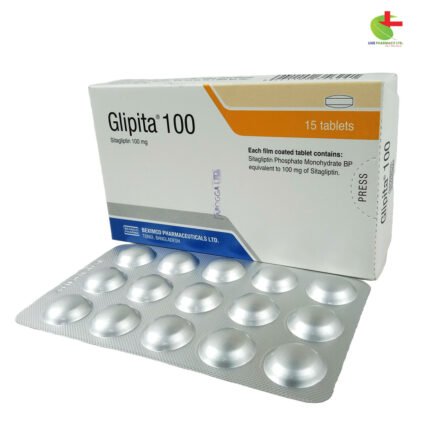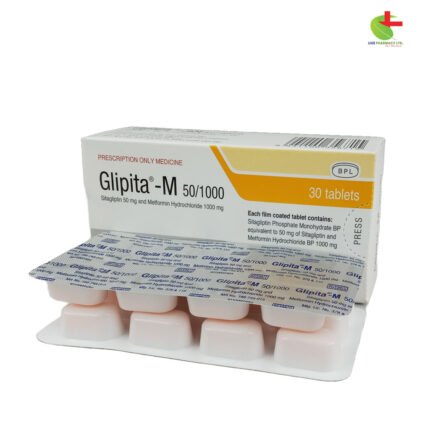Glipita M 500
160.00৳ Strip
- Glipita: Combination medication for type 2 diabetes, combining Sitagliptin and Metformin HCl.
- Function: Sitagliptin enhances incretin hormone effects; Metformin reduces glucose production and improves insulin sensitivity.
- Usage: For use with diet and exercise, taken twice daily with meals.
- Limitations: Not suitable for type 1 diabetes or diabetic ketoacidosis.
 Brand
Brand
|
Beximco Pharmaceuticals Ltd |
|---|---|
 Generics
Generics
|
Sitagliptin + Metformin Hydrochloride |
 Type
Type
|
Tablet |
Indications
Glipita is used as an adjunct to diet and exercise to enhance glycemic control in adults with type 2 diabetes mellitus. It is effective for both monotherapy and combination therapy with metformin. Note that Glipita is not suitable for type 1 diabetes or diabetic ketoacidosis and has not been studied in patients with a history of pancreatitis.
Pharmacology
Glipita combines two antihyperglycemic agents: Sitagliptin, a DPP-4 inhibitor, and Metformin HCl, a biguanide. Sitagliptin helps by prolonging the action of incretin hormones, which enhances insulin release and reduces glucagon levels. Metformin works by lowering hepatic glucose production, reducing intestinal glucose absorption, and increasing peripheral glucose uptake. This combination improves glycemic control through complementary mechanisms.
Dosage & Administration
Glipita should be taken twice daily with meals to minimize gastrointestinal side effects. For those new to metformin, the starting dose is 50 mg sitagliptin/500 mg metformin twice daily. If switching from metformin, adjust the dose to combine existing metformin doses with 50 mg sitagliptin twice daily. Extended-release formulations should be taken once daily with food, adjusting doses based on effectiveness and tolerability.
Interactions
Caution is advised when using Glipita with cationic drugs eliminated by renal tubular secretion. It may also affect the anticoagulant effect of phenprocoumon and reduce the hypoglycemic effect of levothyroxine.
Contraindications
Glipita is contraindicated in patients with renal dysfunction, metabolic acidosis, or a history of severe hypersensitivity reactions to its components.
Side Effects
Common side effects of Glipita include diarrhea, upper respiratory tract infections, and headache. When combined with sulfonylureas or insulin, hypoglycemia may occur.
Pregnancy & Lactation
Pregnancy Category B. Glipita should be used during pregnancy only if necessary. It is not known whether it is excreted in human milk, so caution is advised for nursing mothers.
Precautions & Warnings
Monitor for lactic acidosis, particularly in patients with conditions that may predispose them to this complication. Regular renal function assessments are recommended, and monitor for signs of pancreatitis. Adjust doses in the elderly and patients with renal impairment.
Overdose Effects
In case of an overdose, supportive measures should be employed. Sitagliptin is modestly dialyzable, and Metformin may require hemodialysis for overdose management.
Therapeutic Class
Combination Oral Hypoglycemic Preparations
Storage Conditions
Store below 25°C in a dry place, away from light. Keep out of reach of children and use only under a physician’s prescription.













Reviews
There are no reviews yet.